北京小升初语法第九讲被动语态(初中英语语法被动语态)
初中英语语法——被动语态
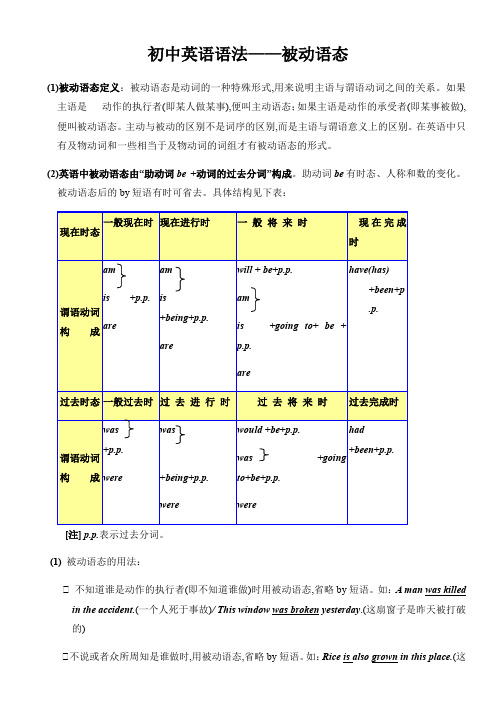
初中英语语法——被动语态(1)被动语态定义:被动语态是动词的一种特殊形式,用来说明主语与谓语动词之间的关系。
如果主语是动作的执行者(即某人做某事),便叫主动语态;如果主语是动作的承受者(即某事被做),便叫被动语态。
主动与被动的区别不是词序的区别,而是主语与谓语意义上的区别。
在英语中只有及物动词和一些相当于及物动词的词组才有被动语态的形式。
(2)英语中被动语态由“助动词be+动词的过去分词”构成。
助动词be有时态、人称和数的变化。
被动语态后的by短语有时可省去。
具体结构见下表:[注]p.p.表示过去分词。
(1) 被动语态的用法:①不知道谁是动作的执行者(即不知道谁做)时用被动语态,省略by短语。
如:A man was killedin the accident.(一个人死于事故)/ This window was broken yesterday.(这扇窗子是昨天被打破的)②不说或者众所周知是谁做时,用被动语态,省略by短语。
如:Rice is also grown in this place.(这个地方也种水稻)/ A railroad will be built here in three years.(三年之后这里将要修建一条铁路)③强调动作的承受者,句尾加by短语。
如:It was written by Lu Xun.(它(书)是鲁迅写的)/ A petdog is never killed by its owner.(宠物狗是不会被主人宰杀的)(2)主动语态如何改写为被动语态:+ 状语+ 状语(动作的承受者) (be +过去分词) (动作的执行者)(3) 注意点:①“动词+间接宾语+直接宾语”改为被动时,可以用间接宾语做被动句的主语。
如:His teacher gave him a dictionary.→He was given a dictionary by his teacher.(老师给他一本字典→他得到老师一本字典)也可以用直接宾语做被动句的主语,但是需用to或者for引出原句的间接宾语。
小升初重要知识归纳被动语态与倒装句的变换与用法
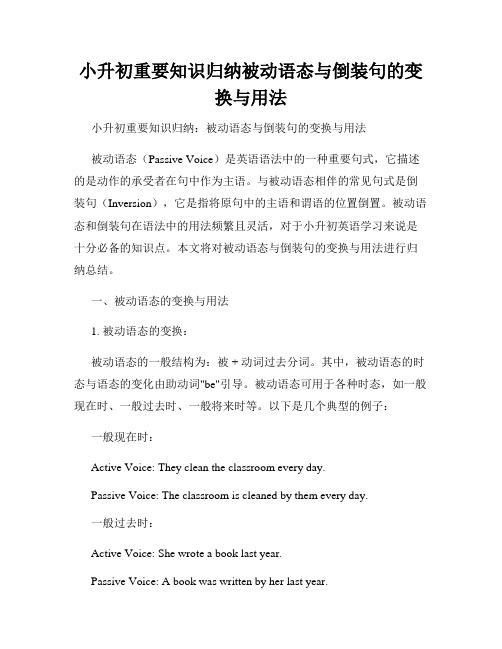
小升初重要知识归纳被动语态与倒装句的变换与用法小升初重要知识归纳:被动语态与倒装句的变换与用法被动语态(Passive Voice)是英语语法中的一种重要句式,它描述的是动作的承受者在句中作为主语。
与被动语态相伴的常见句式是倒装句(Inversion),它是指将原句中的主语和谓语的位置倒置。
被动语态和倒装句在语法中的用法频繁且灵活,对于小升初英语学习来说是十分必备的知识点。
本文将对被动语态与倒装句的变换与用法进行归纳总结。
一、被动语态的变换与用法1. 被动语态的变换:被动语态的一般结构为:被 + 动词过去分词。
其中,被动语态的时态与语态的变化由助动词"be"引导。
被动语态可用于各种时态,如一般现在时、一般过去时、一般将来时等。
以下是几个典型的例子:一般现在时:Active Voice: They clean the classroom every day.Passive Voice: The classroom is cleaned by them every day.一般过去时:Active Voice: She wrote a book last year.Passive Voice: A book was written by her last year.一般将来时:Active Voice: We will finish the project next week.Passive Voice: The project will be finished by us next week.2. 被动语态的用法:被动语态的使用可以强调动作的承受者,减少句子主语的重复,或者将重要信息放在句子的开头以引起关注等。
下面是被动语态常用的几种情况:(1)对承受者的重视:The accident was witnessed by several people.(几个人目击了这次事故。
)(2)强调动作本身而非执行者:The cake was made by my mother.(这个蛋糕是我妈妈做的。
(完整)小升初英语必考语法之被动语态
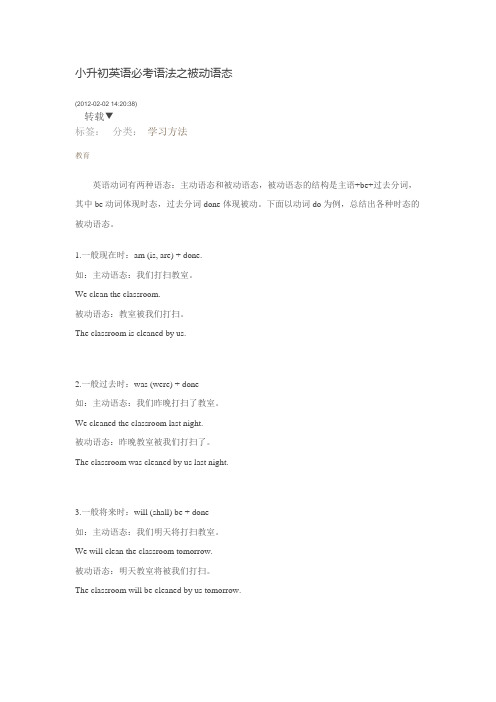
小升初英语必考语法之被动语态(2012-02-02 14:20:38)转载▼分类:学习方法标签:教育英语动词有两种语态:主动语态和被动语态,被动语态的结构是主语+be+过去分词,其中be动词体现时态,过去分词done体现被动。
下面以动词do为例,总结出各种时态的被动语态。
1.一般现在时:am (is, are) + done.如:主动语态:我们打扫教室。
We clean the classroom.被动语态:教室被我们打扫。
The classroom is cleaned by us.2.一般过去时:was (were) + done如:主动语态:我们昨晚打扫了教室。
We cleaned the classroom last night.被动语态:昨晚教室被我们打扫了。
The classroom was cleaned by us last night.3.一般将来时:will (shall) be + done如:主动语态:我们明天将打扫教室。
We will clean the classroom tomorrow.被动语态:明天教室将被我们打扫。
The classroom will be cleaned by us tomorrow.4.现在进行时:am (is, are) being + done如:主动语态:我们正在打扫教室。
We are cleaning the classroom.被动语态:教室正被我们打扫。
The classroom is being cleaned by us.5.过去进行时:was (were) being + done如:主动语态:昨晚这个时候我们正在打扫教室。
We were cleaning the classroom at this moment last night.被动语态:昨晚这个时候教室正在被我们打扫。
The classroom was being cleaned by us at this moment last night.6.现在完成时:have (has) been + done如:主动语态:我们已经打扫了教室。
初中英语语法——被动语态用法总结归纳

初中英语语法——被动语态用法总结归纳被动语态是英语语法中的重要部分,学好被动语态的用法可以帮助学生更准确地理解和使用英语。
下面是被动语态用法的详细总结归纳。
1.被动语态的构成:被动语态由“助动词be+过去分词”构成,根据时态的不同,助动词be的形式也会发生变化。
如:- 一般现在时:am/is/are + 过去分词- 一般过去时:was/were + 过去分词- 一般将来时:will be + 过去分词- 现在进行时:am/is/are being + 过去分词- 过去进行时:was/were being + 过去分词- 现在完成时:have/has been + 过去分词- 过去完成时:had been + 过去分词2.被动语态的用法:被动语态用来强调动作的承受者(主语)而不是执行者,并且常用于以下情景:2.1当我们不知道或不关心动作的执行者时。
例如:The cake was eaten.(蛋糕被吃了。
)2.2当动作的执行者已知,但我们要强调动作的承受者时。
例如:The house was built by my grandfather.(这座房子是我爷爷建的。
)2.3当我们要避免使用第一人称或第二人称时。
例如:Mistakes were made.(犯了错误。
)3.被动语态的注意事项:在使用被动语态时,需要注意以下几点:3.1表示动作的动词要用过去分词形式。
过去分词的形式有规律变化和不规律变化两种。
如:- 规律变化:原形 + ed,例如:played, watched, called- 不规律变化:需要记忆,例如:born, written, eaten3.2被动句的主语是动作的承受者,通常出现在句子的前面。
如:- 主动语态:I cooked dinner.(我做了晚饭。
)- 被动语态:Dinner was cooked by me.(晚饭是我做的。
)3.3 不及物动词不能构成被动语态。
不及物动词没有宾语,因此不能强调动作的承受者。
初中英语知识点归纳被动语态的构成及用法总结

初中英语知识点归纳被动语态的构成及用法总结初中英语知识点归纳:被动语态的构成及用法总结被动语态是英语语法中的一个重要部分,它的构成方式和用法在初中阶段就需要学习和掌握。
本文将对被动语态的构成以及其使用方法进行总结归纳,以供学习者参考和复习。
一、被动语态的构成方式被动语态的构成主要由“be”动词的不同形式加上过去分词构成。
具体来说,根据时态的不同,被动语态的构成方式如下:1. 现在时态:肯定句:am/is/are + 过去分词否定句:am/is/are not + 过去分词一般疑问句:Am/Is/Are + 过去分词 + 其他?2. 过去时态:肯定句:was/were + 过去分词否定句:was/were not + 过去分词一般疑问句:Was/Were + 过去分词 + 其他?3. 将来时态:肯定句:will be + 过去分词否定句:will not be + 过去分词一般疑问句:Will + be + 过去分词 + 其他?4. 现在完成时态:肯定句:has/have been + 过去分词否定句:has/have not been + 过去分词一般疑问句:Has/Have + been + 过去分词 + 其他?注意:过去分词的形式一般是动词的过去式形式,如果动词是不规则动词,则按照不规则动词的形式来变化。
二、被动语态的用法总结被动语态在英语中常用于以下几种情况:1. 强调行为的承受者或受影响的对象。
例如:The book was written by Mark Twain.(这本书是由马克·吐温写的。
)2. 描述客观事实。
例如:The film was released last week.(这部电影上周上映。
)3. 当不知道或无需指明动作的执行者时。
例如:The cake has been eaten.(蛋糕已经被吃掉了。
)4. 口语中经常用于描述自然现象或习惯用法。
例如:English is spoken in many countries.(英语在许多国家中被讲话。
初中英语语法——被动语态用法总结归纳
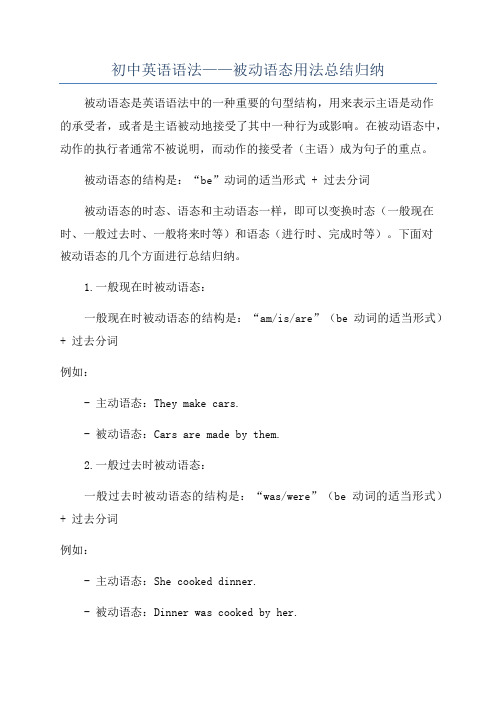
初中英语语法——被动语态用法总结归纳被动语态是英语语法中的一种重要的句型结构,用来表示主语是动作的承受者,或者是主语被动地接受了其中一种行为或影响。
在被动语态中,动作的执行者通常不被说明,而动作的接受者(主语)成为句子的重点。
被动语态的结构是:“be”动词的适当形式 + 过去分词被动语态的时态、语态和主动语态一样,即可以变换时态(一般现在时、一般过去时、一般将来时等)和语态(进行时、完成时等)。
下面对被动语态的几个方面进行总结归纳。
1.一般现在时被动语态:一般现在时被动语态的结构是:“am/is/are”(be动词的适当形式)+ 过去分词例如:- 主动语态:They make cars.- 被动语态:Cars are made by them.2.一般过去时被动语态:一般过去时被动语态的结构是:“was/were”(be动词的适当形式)+ 过去分词例如:- 主动语态:She cooked dinner.- 被动语态:Dinner was cooked by her.3.一般将来时被动语态:一般将来时被动语态的结构是:“will be”(be动词的适当形式)+ 过去分词例如:- 主动语态:You will clean the room.- 被动语态:The room will be cleaned by you.4.进行时被动语态:进行时被动语态的结构是:“am/is/are being”(be动词的适当形式)+ 过去分词例如:- 主动语态:They are painting the wall.- 被动语态:The wall is being painted by them.5.完成时被动语态:完成时被动语态的结构是:“has/have been”(be动词的适当形式)+ 过去分词例如:- 主动语态:She has written a book.- 被动语态:A book has been written by her.需要注意的是,被动语态的主语通常不是动作的执行者,所以经常用于下面几种情况:-当动作的执行者不得而知或不重要时,使用被动语态。
初中英语知识点归纳被动语态
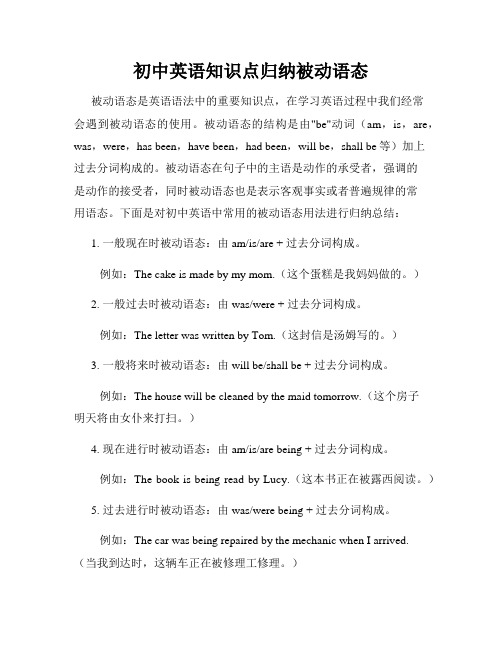
初中英语知识点归纳被动语态被动语态是英语语法中的重要知识点,在学习英语过程中我们经常会遇到被动语态的使用。
被动语态的结构是由"be"动词(am,is,are,was,were,has been,have been,had been,will be,shall be等)加上过去分词构成的。
被动语态在句子中的主语是动作的承受者,强调的是动作的接受者,同时被动语态也是表示客观事实或者普遍规律的常用语态。
下面是对初中英语中常用的被动语态用法进行归纳总结:1. 一般现在时被动语态:由am/is/are + 过去分词构成。
例如:The cake is made by my mom.(这个蛋糕是我妈妈做的。
)2. 一般过去时被动语态:由was/were + 过去分词构成。
例如:The letter was written by Tom.(这封信是汤姆写的。
)3. 一般将来时被动语态:由will be/shall be + 过去分词构成。
例如:The house will be cleaned by the maid tomorrow.(这个房子明天将由女仆来打扫。
)4. 现在进行时被动语态:由am/is/are being + 过去分词构成。
例如:The book is being read by Lucy.(这本书正在被露西阅读。
)5. 过去进行时被动语态:由was/were being + 过去分词构成。
例如:The car was being repaired by the mechanic when I arrived.(当我到达时,这辆车正在被修理工修理。
)6. 情态动词被动语态:由情态动词(can,could,may,might,must,should,would等)+ be + 过去分词构成。
例如:The film can be watched online.(这部电影可以在线观看。
小升初英语被动语态
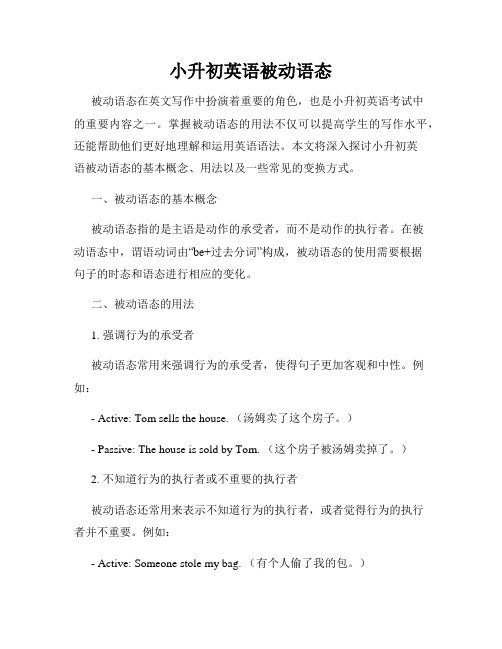
小升初英语被动语态被动语态在英文写作中扮演着重要的角色,也是小升初英语考试中的重要内容之一。
掌握被动语态的用法不仅可以提高学生的写作水平,还能帮助他们更好地理解和运用英语语法。
本文将深入探讨小升初英语被动语态的基本概念、用法以及一些常见的变换方式。
一、被动语态的基本概念被动语态指的是主语是动作的承受者,而不是动作的执行者。
在被动语态中,谓语动词由“be+过去分词”构成,被动语态的使用需要根据句子的时态和语态进行相应的变化。
二、被动语态的用法1. 强调行为的承受者被动语态常用来强调行为的承受者,使得句子更加客观和中性。
例如:- Active: Tom sells the house. (汤姆卖了这个房子。
)- Passive: The house is sold by Tom. (这个房子被汤姆卖掉了。
)2. 不知道行为的执行者或不重要的执行者被动语态还常用来表示不知道行为的执行者,或者觉得行为的执行者并不重要。
例如:- Active: Someone stole my bag. (有个人偷了我的包。
)- Passive: My bag was stolen. (我的包被偷了。
)3. 陈述客观事实被动语态可以用于陈述客观事实,特别是科学、历史、新闻报道等方面。
例如:- Active: Scientists have discovered a new medicine. (科学家们发现了一种新药。
)- Passive: A new medicine has been discovered by scientists. (一种新药被科学家们发现了。
)三、被动语态的变换方式被动语态的基本结构是“be+过去分词”,其中“be”会根据句子的时态和语态进行变化。
以下是一些常见的变换方式:1. 现在时态- 肯定句:am/is/are + 过去分词- 否定句:am/is/are not + 过去分词- 一般疑问句:Am/Is/Are + 过去分词?- 特殊疑问句:特殊疑问词 + am/is/are + 过去分词?2. 过去时态- 肯定句:was/were + 过去分词- 否定句:was/were not + 过去分词- 一般疑问句:Was/Were + 过去分词?- 特殊疑问句:特殊疑问词 + was/were + 过去分词?3. 将来时态- 肯定句:will be + 过去分词- 否定句:will not be + 过去分词- 一般疑问句:Will + be + 过去分词?- 特殊疑问句:特殊疑问词 + will + be + 过去分词?四、常见的注意事项和练习题在使用被动语态时,需要注意以下几点:1. 被动语态中的动词要用过去分词形式;2. 时态和语态要根据句子的意思选择合适的形式;3. 不及物动词无被动语态形式;4. 某些动词不能用于被动语态,如enjoy, like, love等。
- 1、下载文档前请自行甄别文档内容的完整性,平台不提供额外的编辑、内容补充、找答案等附加服务。
- 2、"仅部分预览"的文档,不可在线预览部分如存在完整性等问题,可反馈申请退款(可完整预览的文档不适用该条件!)。
- 3、如文档侵犯您的权益,请联系客服反馈,我们会尽快为您处理(人工客服工作时间:9:00-18:30)。
动词的语态知识梳理:提纲挈领,抓住重点和难点!英语动词有两种语态,即主动语态(The Active Voice)和被动语态(The Passive V oice)。
主动语态表示主语是动作的执行者,被动语态表示主语是动作的承受者,例如:Many people speak English . (主动语态)主语谓语宾语不及物动词后边不能接宾语,所以没有被动语态。
English is spoken by many people. (被动语态)I play basketball.Basketball is played(be done) by me.1、被动语态的构成被动语态由“助动词be +及物动词的过去分词”构成。
助动词be 有人称、数和时态的变化,其变化规则与be作为连系动词时完全一样。
被动语态的肯定式、否定式及疑问式列表如下:肯定句:主语+ be+ 过去分词+(by…)eg. He is often asked to do this work (by his boss).否定句:主语+ be not +过去分词+(by…)eg. I am not invited to the party (by him).一般疑问句:Be + 主语+过去分词+ (by…)?eg. Are your clothes washed by yourself?特殊疑问句:疑问词+ be+主语+过去分词+ (by…)?eg. What is this sweater made of?现以动词give为例,其被动语态的各种时态如下:2、被动语态的用法:1)当我们不知道谁是动作的执行者,或者没有必要指出谁是动作的执行者时,或者只需强调动作的承受者时,要用被动语态。
例如:This jacket is made of cotton.English is spoken in many countries in the world.1)强调动作的承受者时。
如:The boy was saved at last.这个男孩最后得救了。
2)主动语态变被动语态的步骤:主动句: The boy broke the window yesterday.被动句: The window was broken by the boy yesterday.步骤一:原句中的宾语the window变成主语。
步骤二:谓语动词broke改为被动形式:was broken步骤三:原句中的主语The boy放在介词by的后面。
步骤四:其他成分如:yesterday不变。
3) 有两个宾语的句子的被动语态:1. He gave me the book just now.The book was given to me( by him) just now. = I was given the book (by him) just now.2. They show the guard their passports at the entrance to the building.The passports were shown to the guard by them at the entrance to the building.= The guard was shown the passports by them at the entrance to the building.练习与巩固:熟能生巧,取得好成绩!一、选择填空1. The question ______by us soon.A.is going to discussB. will discussC.is going to be discussedD. has been discussed2. The old man was quite weak after the accident, so he______.A. must look afterB. must be taken careC. must be looked afterD. must take care oftake care of=look after3. All the new words ______up in the dictionary yet.A. have lookedB. haven’t lookedC. have been lookedD. haven’t been lookedyet在完成时态中,一般用在否定句和疑问句。
4. There is no room for you. All the seats ______.A.are takenB. was takenC. have takenD. have been taken5. A model ship ______his son by Mr. More.A. was made forB. was made toC. made forD. makes forbe made of 保留原材料的性质,看得出来The kite is made of paper.be made from 失去原材料的性质,看不出来The paper is made from wood.be made in 在...被制作的The clothes is made in China.be made for 为...制作make sb. do sth.让...做...6. ----Dad, please open the door, it ______.----OK, dear. I am coming.A. was lockedB. locksC.is lockedD. locked7. This kind of sweater______ very soft.A.is feltB. feelsC. feelD.is feelingfeel,sound,smell感官动词,物做主语不用被动语态8. ----Have all the students known that our class will visit the factory this afternoon?----Yes. Every student ______about it.A. toldB. has toldC. was toldD. tells9. The cake ______delicious.A. smellB.is smelledC.is smellingD. smells10. My father has given up smoking since he ______on.A. will operateB. will be operatedC. operatedD. was operated11. I________there would be a football match on Channel 8 tomorrow.A. will tellB. have toldC. was toldD. will be told12. The librarian told me that the book______for two weeks.A. can be borrowedB. can be keptC. could be borrowedD. could be kept一段时间,for. 瞬间动词要转换成延续性动词13. When______this kind of computer _______?A. is; usedB. was; usedC. did; useD. are; used14. The new computers_______to the village school as present last month.A. are givenB. givenC. were givenD. gave15. Your shoes_______. You’d better come to get them in half an hour.A. are mendingB. have mendedC. are being mendedD. have been mended16. When_____the accident________?A. was; happenedB. has; happenedC. was happeningD. did; happen二、用所给动词的正确形式填空。
1. Some ideas __were given____(give) to college students by him yesterday.2. ----Do you like the music “Moonlight”?----Yes, it _sounds_really beautiful!(sound)3. He won’t come to the party unless Sue _is invited_.(invite)4. “Quick” is another way of __saying_“fast”.(say)5. This kind of bike __is made_in that factory, but you can’t buy it now.(make)6. Cotton __is planted__in the country.(plant)7. So far, Man-made satellites _have been sent_by Chinese people.(send)8. This kind of shoes _has been sold_out by now.(sell)9. The room must __be kept__ clean every day.(keep)动词的适当形式1.动词的时态变化一般现在时do——does一般过去时do——did一般将来时do——will do现在进行时do——am/is/are doing过去进行时do——was/were doing过去将来时do——would do现在完成时do——have done过去完成时do——had done2.动词的语态变化be done3.三种非谓语动词不定式to do 动名词doing 分词doing,done三、阅读理解(A)Waste can be seen everywhere in the school. Some students ask for more food than they can eat and others often forget to turn off the lights when they leave the classroom. They say they can afford these things. But I don’t agree with them.Waste can bring a lot of problems. Although China is rich in some resources, we are short of others, for example, fresh water. It is reported that we will have no coal or oil to use in 100 years. So if we go on wasting our resources, what can we use in the future and where can we move? Think about it. I think we should say no to the students who waste things every day. Everybody should stop wasting as soon as possible.In our everyday life, we can do many things to prevent waste from happening, for example, turn off the water taps when we finish washing, turn off the lights when we leave the classroom, try not to order more food than we need, and so on. Little by little, everything will be changed. Waste can be stopped one day, if we do our best.1. From the passage we know that some students often _______ in the school.A. eat too muchB. don’t work hardC. waste thingsD. throw rubbish everywhere2. Which is not mentioned in this passage?A. Fresh water.B. Forest.C. Oil.D. Coal.3. What may happen in 100 years?A. We may still have enough oil.B. We may still have enough coal.C. We may have a little oil.D. We may have no coal or oil to use.4. Which of the following is right?A. Waste brings problems.B. Waste can bring no problem.C. China is rich in fresh water.D. Students never waste things.5. Which is the best title of this passage?A. Stop WastingB. School lifeC. Waste in the SchoolD. Rich Resources in China(B)A young man once went into town and bought himself a pair of trousers. When he got home, he went upstairs to his bedroom and put them on. He found that they were about two inches too long.He came downstairs, where his mother and his two sisters were washing up tea things in the kitchen. “These new trousers are too long.” He said. “They need shortening by about two inches. Would one of you mind doing this for me, please?” His mother and sisters were busy and none of them said anything.But as soon as his mother had finished washing up, she went quietly upstairs to her son’s bedroom and shortened the trousers by two inches. She came downstairs without saying anything to her daughters.Later on, after supper, the elder sister remembered her brother’s trousers. She was a kind-hearted girl, so she went quietly upstairs without saying anything to anyone, and shortened the trousers by two inches.The younger sister went to the cinema, but when she came back, she, too, remembered what her brother had said. So she ran upstairs and took two inches off the legs of the new trousers.1. The young man bought the new trousers _______ his size.A. as long asB. two inches longer thanC. as big asD. two inches shorter than2. He asked _______ to shorten his new trousers.A. his mother and sistersB. his two sistersC. his elder sisterD. his mother and one of his sisters3. His mother and sisters ________.A. agreed to do thatB. didn’t want to do thatC. said nothing to himD. said something to him4. His elder sister shortened the trousers ________.A. after finished washingB. before she went to bedC. when she came back from the cinemaD. after having supper5. The next morning the young man would find the trousers were _______too short.A. two inches shorterB. four inches shorterC. six inches shorterD. eight inches shorter(C)A Lesson from the ElderGrandfather was an elder Cherokee Native American who had a wrinkled, nut brown face and kind dark eyes. His grandson often came in the evening to sit on his knee and asked the many questions that children would ask.One day the grandson came to his grandfather with a look of anger on his face and the following story. “Father and I went to the store today and because I helped him, he bought me a present---a jack-knife. I went outside to wait for father and to admire my new knife in the sunlight. Some town boys came by and saw me. They surrounded me and started saying bad things. They called me dirty and stupid and said that I should not have such a fine knife. The largest of these boys pushed me back and I fell over one of the other boys. I dropped my knife and one of them picked it up and they all ran away laughing. I hate them. I hate them all."The elder Cherokee, with eyes that had seen too much, lifted his grandson's face so his eyes looked into the boy's face. Grandfather said, "Let me tell you a story. I, too, at times, have felt a great hate for those who have taken so much with no sorrow for what they do. But hate wears you down and does not hurt your enemy. It is like drinking poison and wishing your enemy would die.I have struggled with these feelings many times. It is as if two wolves are inside me.... It is a terrible fight.One wolf is good and does no harm. He lives in harmony with all around him and does not take offense when no offense was intended. It will only fight when it is right to do so and in the right way. This wolf stands for joy, peace, love, hope, sharing, modesty, kindness, friendship, sympathy, generosity, truth, and faith.The other wolf is full of anger. The least thing will set off his fiercest temper. He fights everyone, all the time, for no reason. He cannot think because his anger and hate are so much. It is helpless anger, for his anger will change nothing. This wolf represents fear, envy, greed, self-pity, guilt, lies, false pride and superiority.Sometimes, it is hard to live with these two wolves inside me for both of them try to control my spirit. This same fight is going on inside you and inside every other person too.”The boy looked into his grandfather's eyes and asked, "Which wolf will win?" The old Cherokee simply replied.... "The one you feed."1. The boy was angry because __________.A. he was not satisfied with his presentB. his back was badly injured in a fightC. he had waited for his father for too longD. his jack-knife had been taken away by some boys2. How does the good wolf do things in the story?A. He never fights against others.B. He tries to get on well with others.C. It is hard for him to live with other wolves.D. Sometimes he had a terrible fight because someone hit him.3. We can learn from the third paragraph that _________.A. “hate” is healthyB. “hate” hurts oneselfC. “hate” is complicatedD. “hate” harms one’s enemies4. What did Grandfather mean by saying "The one you feed" in the last paragraph?A. We should feed the two wolves equally.B. Living in harmony with others is important.C. Our feelings should be expressed at the right time.D. The choices we make determine who we will become.四、完形填空AThe United States covers a large part of the North 1__ continent, when this land first became a nation. After 2 its freedom from England, it has 13 states. Each of the states had a star on the American flag. As the nation 3 , new states were formed and there 4 new stars on the flag. 5 a long time, there were forty-eight states. In 1959 two 6 stars were added to the flag, standing for the new states of Alaska and Hawaii.7 were the first people of the land and great number of people came from England. It is8 that reason that the language of the U.S. is English and 9 its culture and customs are more 10 those of England than any other country in the world.1. A. America B. America's C. American D. Americans2. A. win B. won C. winning D. have won3. A. grew B. grows C. growing D. have grown4. A. are B. were C. have been D. had been5. A. In B. From C. For D. Through6. A. another B. many C. other D. more7. A. India B. Indian C. Indias D. Indians8. A. on B. for C. because D. because of9. A. that B. why C. many D. all10. A. as B. like C. same D. as ifBIDme to go into law. And I’ve ___11___ regretted it. I wanted to be a biologist, but I didn’t purse my dream. You know what you want. Go fulfill it.”A s it turned out, my little publication went on to become Student, a nation magazine for young people in the U.K. My wife and I have two children, and I’d like to think we are bringing them up in the same way Dad ___12__ me.1. A. biologist B. manager C. lawyer D. gardener2. A. praise B. courage C. power D. warmth3. A. unnecessary B. unkind C. unimportant D. unusual4. A. Another B. Some C. Any D. Other5. A. in case B. by turns C. by chance D. in return6. A. understanding B. experienced C. serious D. demanding7. A. taking up B. making up C. picking up D. keeping up8. A. suggestion B. decision C. notice D. choice9. A. and B. as C. even if D. as if10. A. helped B. allowed C. persuaded D. suggested11. A. always B. never C. seldom D. almost12. A. controlled B. comforted C. reminded D. raisedCThe car,running along the well-lit road,now sank in darkness. I broke the__1__on purpose,for fear that the driver was too tired to drive. “When do you go back home in the evening?” “9 o'clock after this trip.” “Then when do you drive out in the morning?”I threw out another question.“9 o'clock,too-just as if I worked at an office.” His__2__surprised me,because every time I ride a taxi,what I hear from the driver are only complaints that they have to work from morning till night,it's hard to earn money,they're often__3__by the police,or that their leaders are seated lazily,__4__the fruits. But this driver told me,“I find it tiring to be a section chief as I was before. I like driving just for__5__.It's fortunate that I hardly drive without a passenger. So I earn two or three thousand yuan a month with ease. Yes,I never__6__an empty taxi. If it goes southward,I go northward. If it goes along a highway,I__7__into a narrow street.”His words showed his__8__with his life and the pride he took in his job. Such feelings are so__9__among people nowadays as oxygen in high mountains. As an ancient saying goes,“Neither joy in material__10__nor grieve(悲痛)over personal setbacks.” How many people nowadays can show high ideals by__11__living and go far with a calm mind?I couldn't help feeling curious when finding such a state of mind in a stranger on a cold__12__.1.A. window B.stillness C.quietness D.silence 2.A. easiness B.confidence C.attitude D.character 3.A. fined B.ordered C.detected D.seized 4.A. keeping B.tasting C.enjoying D.choosing 5.A. freedom B.pleasure C.hobby D.money 6.A. meet B.admire C.envy D.follow 7.A. look B.knock C.turn D.crash 8.A. intelligence B.satisfaction C.petition D.honesty 9.A. normal B.regular C.serious D.rare 10.A.gains B.concerns C.supports D.loss 11.A. special B.happy C.original D.simple 12.A. morning B.night C.moment D.season。
